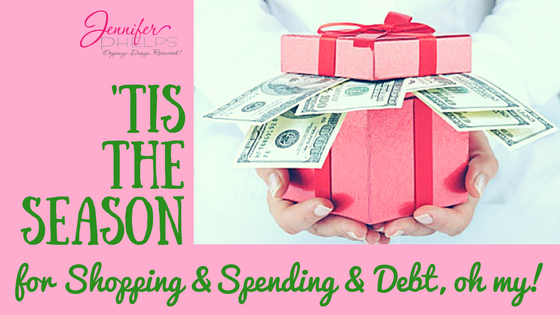Hello, Friend!
As of this past Friday, Jeff Bezos, CEO of Amazon, is worth $100 billion dollars. Yup, Black Friday shopping pushed his bank account above this impressive threshold.
I don’t begrudge him. I love Amazon. And who wouldn’t like to be a $100 billionaire?! But it got me thinking.
How much money have I contributed to helping Jeff Bezos realize his dreams at the expense (literally) of my own?
I buy stuff I need and want, and for people I love. But I also see how I and many of my clients have purchased themselves into debt and cluttered overwhelm. And there’s nothing like the holidays to shine a spotlight on our personal relationship to money, spending and motivation – be that healthy or not-so-much. So, with the busy, crazy, spendy holiday season upon us, I did a little research…
How and Why We Buy
Psychology of Spending: Tony Robbins, in his article People Buy Feelings, Not Things, says, “While product quality and seller reputation matter… roughly 90% of purchasing decisions are made subconsciously…” That’s an actual statistic, by the way! He says that we all share fundamental needs “that determine how we feel about ourselves, how we feel about others, and how we experience life. All behavior, including our purchasing decisions, is an attempt to meet our needs.” That’s human nature, so if a retailer can hit on one of our needs, they’ve got us, even if the purchase is a gift for someone else, “because we subconsciously believe that giving someone a gift will get us attention, appreciation or even love.”
Science of Spending: Harvard Business Review says there’s an entire science dedicated to manipulating customers’ emotions to increase sales. In The New Science of Customer Emotions, they write, “Our research across hundreds of brands in dozens of categories shows that it’s possible to rigorously measure and strategically target the feelings that drive customers’ behavior. We call them ‘emotional motivators.’ They provide a better gauge of customers’ future value to a firm than any other metric…” Wow! That’s Mad Men speak for – they know how to make you buy, Baby, buy!
But I promise – YOU DON’T HAVE TO! With a little guidance and self-observation, we can learn what motivates us to spend and heal it if necessary.
Influences on Money Habits and Emotional Triggers
According to Money Habitude, some of the biggest influences on how we form our money habits and emotional spending triggers include:
- Parents, family & significant people
- Traditions & culture
- Spiritual beliefs & practices
- Individual personality and life experiences
- Media messaging
While it’s unlikely that you’ll unearth all of your subconscious spending triggers that have been handed down the generations by December 25th, just the awareness that you HAVE subconscious spending triggers will help you break the pattern and make new, healthy habits moving forward.
How to Create a Healthy Budget: Household Management 101 suggests that your Christmas budget should be about what you make in one paycheck – a little more if you’re a saver, less if you’ve already got debt. Does that seem austere or about right to you? Whatever you decide is the right budget for your family, the point of holiday gift giving is to be HAPPY, not to regret the expenses and be saddled with debt in January.
Dave Ramsey has some fab ideas to help you create The Christmas Budget You’ve Always Wanted or maybe never knew you wanted 😉 :
- Look at what you spent last year (if you didn’t keep track, start keeping track this year!)
- Divide your budget into categories (decorations, wrapping paper, travel, festive meals, charitable donations, and anything else you’re planning to do)
- Write down who you need to buy for
- Track your spending (receipts in an envelope)
- Consider using cash (avoid loading up those credit cards)
- Plan ahead, make a Christmas fund
Like lists? Here are a couple o’ dandy ones:
Christmas Budgeting Form
The holidays are rich with opportunities to observe and heal our personal spending habits, to break unhealthy family traditions, to buck our consumerist culture, to reevaluate how we value things and use gift giving as a teachable moment for the next generation. If you need help liberating yourself or navigating the holiday season with grace and humor, I’m here for you, call me!







